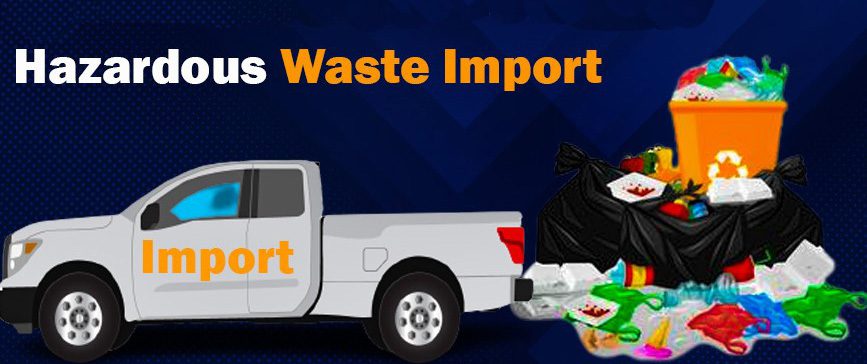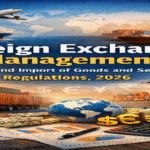Hazardous wastes are often disposed directly into the environment posing health and environment risk. Control of dumping is thus key issue for any Government while designing and implementing regulations.
To reduce the movement of hazardous wastes between the nations specially to prevent transfer of hazardous waste from developed countries to less developed countries, an International Treaty i.e. “The Basel Convention on the Control of Transboundary Movements of Hazardous Waste and their Disposal” (which took effect in 1992) was designed.
As per this Convention, Parties are entitled to prohibit the import of the hazardous waste and are bound to prohibit its export if importing country does not consent in writing to a specific import.

In the consonance with the above treaty and in order to strengthen the implementation of environmentally sound
In the consonance with the above treaty and in order to strengthen the implementation of environmentally sound management of hazardous waste in India, the Central Government Vide G.S.R 395( E) dated 4th April 2016 amended Management and Handling Rules, July 28th 1989 and published the Hazardous and other wastes (Management and Transboundary Movement) Rules 2016 to ensure safe handling, generation processing, treatment, package, storage, transportation, use reprocessing, collection, conversion and offering for sale, destruction and disposal of the hazardous waste.
, the Central Government Vide G.S.R 395( E) dated 4th April 2016 amended Management and Handling Rules, July 28th 1989 and published the Hazardous and other wastes (Management and Transboundary Movement) Rules 2016 to ensure safe handling, generation processing, treatment, package, storage, transportation, use reprocessing, collection, conversion and offering for sale, destruction and disposal of the hazardous waste.
Hazardous wastes are prohibited for Import for disposal in the India, however it is allowed for recycle, reuse, recovery and co-processing purposes. In order to regulate import and export of hazardous and other waste, the Ministry of Environment Forest and Climate Change (MOEFCC) has made provisions in the regulations under Chapter III sub Rules 11,12,13,14 and 15 of Rules 2016. The type of wastes to be imported and exported have been listed under Part A to D of the schedule III (list of items enclosed for your ready reference).
If anyone wish to import/export hazardous and other wastes must know that which hazardous wastes can be imported or exported and in which case it is necessary to take approval/permission of MOEFCC and consent of exporting/ importing country and what are those procedures which are to be followed. The following table will help you to identify the wastes for import and export purpose as per Hazardous Waste Rules, 2016.
Import and Export of Hazardous and Other Wastes
Provision for Import and export of hazardous and other wastes are as under: –
- MOEFCC shall be the nodal Ministry to deal with the transboundary movement of the hazardous and other wastes.
- No import of the hazardous and other wastes permitted for disposal.
- Import of hazardous and other wastes permitted only for recycling, recovery, reuse and utilisation including co-processing.
Hazardous wastes are divided under various parts of the Schedules III & VI of the said Rules. Each part of the schedule prescribes the conditions to be followed for the import/export. The information is summarised below: –
Approvals and/or consent required for Import of Hazardous and other Wastes
| Schedule | Part | Condition | Approvals/consent |
|---|---|---|---|
| III | A | Actual User | Prior informed consent of exporting country +Require the permission of MOEFCC |
| B | Actual User | Require the permission of MOEFCC | |
| C |
Actual User (Not specified in Sch. III but exhibiting the hazardous characteristics outlined in Part C) | Prior written permission of MOEFCC | |
| D | Actual User | No permission required from MOEFCC instead furnish information in Form 6 to the Customs Authorities, accompanied with the documents listed in Schedule VIII | |
| VI | – | Prohibited | No import allowed. |
Approvals and/or consent required for Export of hazardous and other wastes
| Schedule | Part | Approvals/consent |
|---|---|---|
| III | A | Require permission of MOEFCC + Prior informed consent of importing country |
| B | Require permission of MOEFCC | |
| VI | – | Require permission of MOEFCC + Prior informed consent of importing country |
Procedure for import of Hazardous and other Wastes
- Part A and Part B of Schedule III -Importer of wastes specified in Part A and Part B of Schedule III shall apply in Form 5 along with the documents listed therein and acknowledgement of copy of application submitted to concerned State Pollution Control Board.
- Part C of Schedule III- Wastes not specified in Schedule III but exhibiting the hazardous characteristics outlined in Part C, shall require prior written permission of the MOEFCC.
- – Importer shall not require the permission of MOEFCC instead shall have to furnish the information as per Form 6 to the Customs Authorities, accompanied with documents listed in Schedule VIII.
- On receipt of the complete application the MOEFCC, shall examine the application considering the comments and observations, if any, received from the State Pollution Control Boards, and may grant the permission for import within a period of 60 days.
- The importer shall maintain records of the waste imported in Form 3 and shall file an annual return in Form 4 to the State Pollution Control Board on or before the 30th day of June following the financial year to which that return relates.
- Samples of wastes imported for testing or research and development purposes up to 1000 gm or 1000 ml shall be exempted from taking permission.
- Shipment must accompanied with the movement document as given in Form 6 and the test report of analysis of the waste, consignment, wherever applicable
Procedure for Export of hazardous and other wastes from India.
- Part A of schedule III & Schedule VI: Any occupier intending to export waste specified in Part A of Schedule III and Schedule VI, shall make an application in Form 5 along with insurance cover to the MOEFCC, with the prior informed consent in writing from the importing country.
- Part B of Schedule III: Occupier intending to export waste specified in Part B of Schedule III shall make an application in Form 5 along with insurance cover to the MOEFCC.
- On receipt of an application, the MOEFCC may give permission for the proposed export within a period of 60 days from the date of submission of application
- The exporter shall ensure that no consignment is shipped before the prior informed consent is received from the importing country, wherever applicable.
- The exporter shall also ensure that the shipment is accompanied with movement document in Form 6.
- The exporter shall maintain the records of the hazardous or other waste exported by him in Form 3 and the record so maintained shall be available for inspection.
Import or export shall be considered illegal, if: –
- It is without permission of the Central Government in accordance with these rules; or
- The permission has been obtained through falsification, mis-representation or fraud; or
- It does not conform to the shipping details provided in the movement documents; or
- It results in deliberate disposal (i.e., dumping)
In case of illegal import, the importer shall re-export the waste in question at his cost within a period of 90 days from the date of its arrival into India
In case of disposal of such waste by the Port and Custom authorities, they shall do so in accordance with these rules with the permission of the Pollution Control Board of the State where the Port exists.
Importer is not traceable then the waste either can be sold by the Customs authority to any user having authorisation under these rules from the concerned State Pollution Control Board or can be sent to authorised treatment, storage and disposal facility.
The conformity of the above provisions under the said Rules is required before the import or export of Hazardous Waste or other waste. In case of any clarification, please feel free to contact us at connect@osganconsultants.com.




